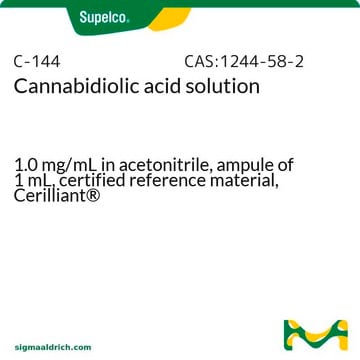T-007
(±)-11-nor-9-Carboxy-Δ9-THC-D9 solution
100 μg/mL in methanol, ampule of 1 mL, certified reference material, Cerilliant®
About This Item
Recommended Products
grade
certified reference material
form
liquid
feature
Snap-N-Spike®/Snap-N-Shoot®
packaging
ampule of 1 mL
manufacturer/tradename
Cerilliant®
drug control
psicótropo (Spain); Decreto Lei 15/93: Tabela IIB (Portugal)
concentration
100 μg/mL in methanol
technique(s)
gas chromatography (GC): suitable
liquid chromatography (LC): suitable
application(s)
cannabis testing
forensics and toxicology
format
single component solution
storage temp.
-10 to -25°C
SMILES string
OC1=C2C3C(CCC(C(O)=O)=C3)C(C([2H])([2H])[2H])(C([2H])([2H])[2H])OC2=CC(CCCCC([2H])([2H])[2H])=C1
InChI
1S/C21H28O4/c1-4-5-6-7-13-10-17(22)19-15-12-14(20(23)24)8-9-16(15)21(2,3)25-18(19)11-13/h10-12,15-16,22H,4-9H2,1-3H3,(H,23,24)/i1D3,2D3,3D3
InChI key
YOVRGSHRZRJTLZ-GQALSZNTSA-N
Looking for similar products? Visit Product Comparison Guide
General description
Application
- Hydrodesulfurization research using pharmacosiderite Mo(4)P(3)O(16): This study utilized the microporous catalytic activity of synthesized Mo(4)P(3)O(16) under moderate temperatures for hydrodesulfurization, showing its potential in refining processes relevant to forensic toxicology for substance identification, including THC metabolites (Ishikawa et al., 2024).
- Synthesis of acyl cyclopentaquinolinones: Research demonstrated the construction of acyl cyclopentaquinolinones with potential implications for the synthesis and analysis of synthetic cannabinoids, helping to understand cannabinoid biochemistry and metabolism (Xue et al., 2024).
- Nutraceutical applications from biomass: The production and characterization of xylooligosaccharides from lignocellulosic biomass were reviewed, relevant for cannabinoid research by providing insights into plant-derived compound processing and applications, influencing synthetic THC derivative studies (Kumar et al., 2024).
- Adverse event detection in pharmaceutical care: This study evaluated deep learning models for detecting adverse events from pharmaceutical care records, offering a methodological approach that could be adapted for monitoring effects related to synthetic cannabinoids in clinical settings (Nishioka et al., 2024).
Legal Information
related product
Signal Word
Danger
Hazard Statements
Precautionary Statements
Hazard Classifications
Acute Tox. 3 Dermal - Acute Tox. 3 Inhalation - Acute Tox. 3 Oral - Flam. Liq. 2 - STOT SE 1
Target Organs
Eyes,Central nervous system
Storage Class Code
3 - Flammable liquids
WGK
WGK 2
Flash Point(F)
49.5 °F - closed cup
Flash Point(C)
9.7 °C - closed cup
Certificates of Analysis (COA)
Search for Certificates of Analysis (COA) by entering the products Lot/Batch Number. Lot and Batch Numbers can be found on a product’s label following the words ‘Lot’ or ‘Batch’.
Already Own This Product?
Find documentation for the products that you have recently purchased in the Document Library.
Customers Also Viewed
Our team of scientists has experience in all areas of research including Life Science, Material Science, Chemical Synthesis, Chromatography, Analytical and many others.
Contact Technical Service

















